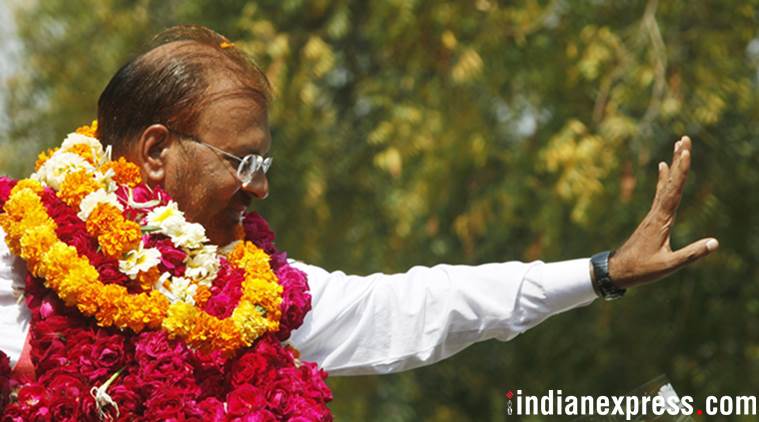 Sohrabuddin Shaikh ‘fake’ encounter: During the hearing, CBI made its stand clear before the court and said it was not opposing the discharge of Vanzara (above), Pandiyan and Dinesh. (Express Photo)
Sohrabuddin Shaikh ‘fake’ encounter: During the hearing, CBI made its stand clear before the court and said it was not opposing the discharge of Vanzara (above), Pandiyan and Dinesh. (Express Photo)
THE BOMBAY High Court Monday upheld the discharge granted to five police officers, including former Gujarat ATS chief D G Vanzara, by a sessions court in the alleged fake encounter case of Sohrabuddin Shaikh, his wife Kausarbi and aide Tulsiram Prajapati in 2005-06 on grounds of insufficient evidence and lack of sanction for prosecution.
Justice A M Badar pronounced the judgment in six applications: Three filed by Sohrabuddin’s brother Rubabuddin Shaikh challenging the discharge of Vanzara and IPS officers Dinesh M N and Rajkumar Pandiyan, and two by the CBI against Rajasthan Police constable Dalpat Singh Rathod and Gujarat Police officer N K Amin.
The court also discharged Gujarat IPS officer Vipul Aggarwal, whose application was rejected by the trial court in November 2017. The trial against Aggarwal was stayed by the High Court until his application challenging the sessions court’s decision was decided.
Picking holes in some of the CBI’s key contentions, the court discarded the statement of the key witness, stating that it is “not gaining any corroboration from…other witnesses” to proceed against Vanzara and Pandiyan, the former Gujarat SP. The court ruled that there was no other evidence to prove the presence of Vanzara and Pandiyan at Illol village, when the body of Kausarbi was allegedly burnt in November 2005, days after Shaikh was killed, according to the CBI.
The court also held that a meeting of Vanzara and Dinesh, two months prior to the alleged encounter killing of Shaikh, was “not clandestine” and “reflected in the official documents”.
The court observed that if Prajapati was really abducted with Shaikh and Kausarbi with an intention to eliminate them, then he would have been killed along with them rather than more than one year later — and that too, after producing him before various courts and detaining him in jail during that period.
“If Tulsiram Prajapati was one of the prime eye witnesses to the abduction of Sohrabuddin Shaikh and Kausarbi, and Sohrabuddin Shaikh was to be killed by the accused persons shortly thereafter, then why was Tulsiram Prajapati allowed to go freely is not clear from the charge sheet,” it said.
“There is no iota of evidence to infer meeting of minds of respondent/ discharged accused No.1 D G Vanzara and other accused persons for doing illegal act of abducting Sohrabuddin Shaikh, Kausarbi and Tulsiram Prajapati, and subsequently killing them. It is not prima facie seen that respondent/discharged accused No.1 D G Vanzara was having an object to accomplish, and hence, a plan or scheme was framed by him along with others for committing the alleged crime,” the court said.
On the point of prosecution sanction under Section 197 of the Criminal Procedure Code, the court, in the case of Vanzara and Pandiyan, held: “In the instant case, as allegations made against the discharged accused in charge sheets filed by the prosecuting agencies show that the alleged offence was committed by the respondent/discharged accused No.1 in discharge of his official duty and under the colour of office, even if it is assumed that the discharged accused acted in excess of his official duty, then also he is entitled to claim protection of section 197 of the Code of Criminal Procedure.”
The court, while discharging Aggarwal, observed that there was no sufficient ground to prosecute him. Among the allegations against Aggarwal, the CBI had said that he had destroyed the leave records of an accused policeman, Ashish Pandya, which showed that he was specifically called from his leave to participate in the alleged encounter of Tulsiram on December 28, 2006. The CBI alleged that this was done to shield Pandya.
Justice Badar, however, accepted Aggarwal’s contention that the record was destroyed in 2008 as part of the ‘Nirmal Gujarat Drive’ initiated by the government to classify and destroy records, which do not require to be preserved. “Thus, destruction of destructible official record done in the course of official duty by (Aggarwal) is not forming any ground to frame the charge against him by raising strong suspicion against him,” the court said.
While discharging Pandiyan, the court said the CBI’s chargesheet does not explain as to why even a Test Identification Parade was not conducted by the prosecution. Even a photograph of Pandiyan was not shown to the key witnesses by investigators, the court said. “Thus, except confessional statements of both accomplices, there is no iota of evidence to infer presence of respondent/discharged accused No.2 Rajkumar Pandiyan on the spot at the time of alleged abduction of Sohrabuddin Shaikh and two others,” the court said.
On the CBI allegation that Dinesh M N had directed a specific staff be sent to escort Tulsiram as part of the conspiracy, the court observed that it only reflected his ‘careful attitude’. “Even if it is assumed that (Dinesh MN) had directed specific staff to escort Tulsiram to Ahmedabad, this fact only reflects the careful attitude of the Superintendent of Police, Udaipur, in the light of the criminal background of the prisoner.”
The fake encounter case dates back to November 2005 when suspected gangster Shaikh was said to have been travelling in a Sangli-bound bus from Hyderabad, along with Kausarbi and Prajapati, when a police team allegedly chased the bus and forced the three to alight. According to the CBI, the three were eventually taken to Ahmedabad where Shaikh was killed followed by Kausarbi within days — and Prajapati a year later.